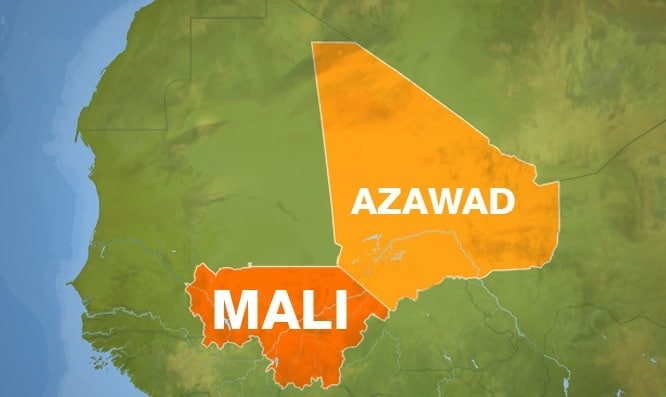By Jeremy Keenan June 2, 2015.
Twenty-eight months after France’s military intervention in Mali in January 2013 to end the Islamist extremist insurgency and Mali’s “crisis”, a much-trumpeted peace signing ceremony was scheduled to be held in the capital, Bamako, on 15 May 2015. The intended signatories were the Mali government, a number of government-backed militia and the Coordination for the Movements of Azawad (CMA). The CMA comprised some half-dozen groups, including the two main Tuareg rebel groups, the Mouvement National pour la libération de l’Azawad (MNLA) and the Haut Conseil pour l’Unité de l’Azawad (HCUA), who took up arms in January 2012 for the independence of “Azawad”, as Tuareg call northern Mali.
The ceremony was an embarrassment to those who had been promoting it. Only Mali’s foreign minister, Abdoulaye Diop, three representatives of pro-Bamako militias (who had previously been part of the Islamist insurgency that took over northern Mali during 2012) and two minor members of the CMA signed the Algiers-drafted agreement. The MNLA and HCUA refused to sign.
Pierre Boilley, the French African historian and internationally recognised authority on Mali, described the peace deal as not worth the paper it was written on. I had earlier described it as a farce.Both descriptions fall short of the mark. The peace deal is much worse than that because conflict and instability in Mali, as this peace deal will cause, tend to have consequences, especially in terms of the spread of extremist militancy, for the wider Sahelian and North African regions.
Fallout from NATO’s Libya attack
The crisis that engulfed Mali in 2012 was a direct consequence of NATO’s imprudent invasion of Libya. In late 2011, Tuareg fighters returning from Libya joined up with remnants of the 2008-2010 Tuareg rebellion in Mali to form the MNLA. In January 2012, they took up arms and quickly put the ill-led and ill-equipped Malian army to flight. In April, they declared Azawad an independent state.
Algeria, always fearful that a successful Tuareg rebellion in the Sahel would trigger unrest in Algeria, succeeded in undermining the MNLA rebellion by instigating an “Islamist insurgency” in northern Mali, comprising three Islamist groups; al-Qaeda in the Islamic Maghreb (AQIM), Ansar al-Dine and Mouvement pour l’Unicité et le Jihad en Afrique de l’Ouest (MUJAO) – over which its secret service, the Département du Renseignement et de la Sécurité (DRS), had extensive control. The MNLA was quickly sidelined as the Islamists took control of Azawad. Their threat to southern Mali and Bamako was saved by France’s military intervention.
The 15 May 2015 peace ceremony was almost two years in the making, starting from the Ouagadougou Accord of June 2013. Signed by the Mali government and the MNLA and HCUA, the accord agreed a ceasefire, a presidential election (on 28 July) and the start of peace talks within 60 days of the election.
The subsequent peace process is a classic example of how not to resolve conflicts and achieve even a short-term, let alone lasting peace.
That was never the intention of either the Mali government or Algeria, which had offered its services, or, as some might say, pushed itself on Mali and the international community, as the intermediary.
From the moment Ibrahim Boubacar Keïta (IBK) was elected president, the Mali government’s political strategy towards the rebels and the peace process reflected the dangerous, popular mood of Bamako’s streets and the political and military leadership’s desire for military revenge for the rebels’ humiliation of the Malian army.
Demonising the Tuaregs
Aided and abetted by a number of academics and journalists, apologists for the Bamako regime, IBK’s government demonised the Tuareg rebels as “terrorists”, “traffickers” and “criminals”. Such demonisation intensified when the MNLA and HCUA refused to accept the Algiers-drafted peace deal, presented to them on 27 February 2015, for making no concession to the autonomy or federalism that they had been requesting since the Algiers talks started in July 2014.
Nor has Algeria been motivated by the goal of lasting peace. Rather, its main interests have been two-fold. One is to prevent a peace deal that would give Tuareg any form of self-government and political rights. Algeria fears that would trigger unrest and secessionist tendencies amongst its own Tuareg population.
Azawad Tuareg do not trust Algeria. They know the DRS promoted the Islamist insurgency that derailed their rebellion in 2012. Several are now accusing the DRS of using threats, promises and monetary payments to infiltrate the MNLA and cajole it into signing the peace deal. Algeria’s plans for Mali are about preserving the status quo rather than any new progressive political system. Moroccan media, not surprisingly, have even accused Algeria of pushing Mali into all-out civil war.
Algeria’s second interest is hydrocarbons. In July 2014, when it was decided that peace talks would be held in Algiers, Sonatrach, the Algerian national oil company, contacted the Malian authorities to ensure its licence in northern Mali was still valid and to indicate it would begin exploratory drilling once a peace agreement was signed.
Three months later, in what is believed to have been a secret deal with Algeria, Mali rescinded 10 foreign oil exploration concessions and production-sharing agreements in the Taoudéni and Gao basins in northern Mali and the Nara basin in the west on the grounds that they had not been taken up (because of the insecurity). It is suspected they were to be offered to Sonatrach following the delivery of a peace deal satisfactory to IBK’s government.
Moreover, the Algiers-based peace talks, extending over eight months, were a kind of “peace by diktat”. Algiers kept the various parties apart, with the Tuareg rebels never having more than a few minutes of direct dialogue with their adversaries. The result was a peace deal into which they had had virtually no input.
West ignores plight of Tuareg
The international community, from the UN to EU member states, has remained remarkably ill-informed on both the Tuareg situation and Algeria’s regional interests, being obsessed with a US-promoted notion of “security” and their own geopolitical interests.
While Mali’s prime minister couldn’t sign the Algiers-drafted accord fast enough on 1 March, the CMA asked for a postponement while it sought the advice of its own people. With some 3,000 local CMA delegates voicing their opposition to the draft agreement, CMA spokesman Bilal ag Acherif said it did not take into account “the essential elements of the legitimate aspirations of
the people of Azawad” and that the CMA was therefore “requesting a meeting with the mediators and international partners” to discuss the process further.
While the Mali government immediately rejected this request, the international community believed that the MNLA and HCUA would succumb to its unseemly pressure, its threats of sanctions and the inducements of Algeria’s DRS. But the rebels held out, with those members of the international community who did turn up for the Bamako farce looking a little foolish.
The result of the peace deal is that the Mali government and army can now return to war, as it has wanted to do these last two years, and probably once again be humiliated; the drug-traffickers can get back to the business they never really stopped; the former “terrorists” of MUJAO, now a government militia serving as proxy for the Mali army, can continue to wreak havoc; Algeria’s foreign policy of destabilising its neighbours can ratchet up another success; France will be able to legitimise its continued post-colonial military presence in the region; local Tuareg feuding will probably intensify; international aid agencies will cry crocodile tears and wring their hands in despair, while the UN will continue in its semi-detached role of not quite knowing what it is meant to be doing in the area to start with.
The losers, of course, will be the civilian populations – the women, children, old and infirm – of all ethnic groups in the region who have already suffered terribly.
Since 15 May, 10 days before this was written, there have been at least 12 outbreaks of fighting in northern and central Mali. Unless stopped very soon, this renewed fighting has the potential to trigger wider regional Tuareg unrest and exacerbate the already chaotic situation in Libya and the tensions in other neighbouring states.
Source: www.middleeasteye.net


















